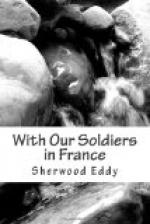Let us visit a typical hut to grasp the significance of its work, in order that we may realize what is going on in the fifteen hundred similar centers. We are on the great Salisbury Plain, in the midst of thirty miles square of weltering mud during the long winter months. To realize what a hut means to the men in such a place, we must understand the unnatural situation created by the conditions of war. Here are multitudes of men far from home, shut out from the society of all good women, taken away from their church and its surroundings, weary and wet with marching and drilling, often lonely and dejected, in an atmosphere of profanity and obscenity in the cheerless barrack rooms, and tempted by the animal passions which are always loosed in war-time. The men need all the help we can give them now, and need it desperately.
Now can you measure just what a big warm hut means to these men as a home, far away from home? The red triangle at the entrance gleams across the whole camp and stands for the three things the soldier most needs.
It stands, in the first place, as a pledge for supplying the physical need of these hungry, lonely, and fiercely tempted men. A dry shelter, a warm fire, a cheerfully lighted room, the bursts of song, and the hum of conversation make the men forget the wind and rain and mud outside. Supper and a hot cup of coffee satisfy their hunger. On the notice-board is the announcement of the outdoor sports, football tournaments, and the games, where the thirty thousand men of the division will compete in open contest on the coming Saturday, under the direction of the Y M C A. Whatever the soldier needs for his physical life, whether it is to eat or to sleep, a bed in London, a cool drink in the thirsty desert, or hot coffee in the trenches, it is furnished for him by the Association.
The hut also provides for the soldier’s intellectual and social needs. The piano and the phonograph, the billiard tables, draughts and chess boards, tables for games, library, and reading room keep him busy; and the concerts, stimulating lectures, moving pictures, educational classes, and debating societies provide him with recreational and mental employment.
The far deeper moral and spiritual needs of the soldier are also met. As the evening draws to a close, one sees the secretary in his military uniform stand up on the table; hats are off and heads are bowed at the call for evening prayers, which are held here every night. On Sunday the parade services of the different denominations take place in turn in the Association hut. Weekly voluntary religious meetings are also held. At one end of the building is the “quiet room,” where groups of Christian soldiers can meet for Bible classes or for prayer. At regular intervals evangelistic meetings are held. On our last night at this hut, on a Sunday evening, twelve hundred men gathered to listen to the Christian message.




